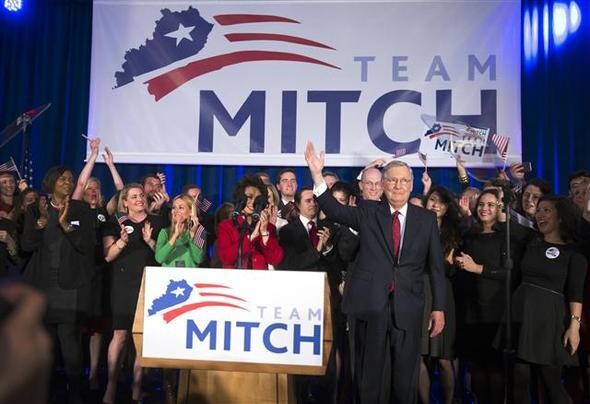hankyoreh
Links to other country sites 다른 나라 사이트 링크
[Editorial] The beginning of Obama as a lame duck president

As expected, the Republican Party took control of the US Senate in the midterm elections on Nov. 4, leaving the opposition in control of both houses of Congress. President Barack Obama is now certain to enter the remaining two years of his presidency as a lame duck.
Midterm elections amount to a vote of confidence in the president, and it’s often the ruling party that loses. Indeed, in the 21 midterm elections held since 1910, the ruling party has lost an average of 30 seats in the House and four in the Senate each time. In this week’s election, the Democrats lost more than the average in the Senate and fewer in the House.
In truth, the Obama administration‘s performance in the areas that US voters are most concerned about - jobs and economic growth - has been pretty decent. The US is one of the few advanced economies maintaining consistent growth. The unemployment rate is hovering below 6%, while the deficit and gas prices have both fallen. Yet neither Obama nor his party were able to overcome the barrier of voter distrust. Some of the president’s more ambitious programs on health insurance reforms, immigration policy, and environmental issues have also been some of the most divisive.
It’s now more important than ever for Obama to find a way of cooperating with Republicans. He can’t expect to get his way on any of the domestic issues that require congressional ratification if he goes the route of predecessors like George W. Bush who took a “my way or the highway” approach even after a midterm defeat. The Democrats’ loss doesn’t mean the Republicans have the voters‘ hearts and minds, and the Republicans are more aware of that than anyone. The best option lies in bridging the distrust through bipartisan dialogue.
For the rest of the world, the main focus is what effect the election will have on foreign policy. Some are predicting that the Republican gains will mean a more hard-line approach from the Obama administration. The first issues on the table are likely to be the response to the Islamic State and the situation in Ukraine. Neither of them is going to be resolved easily, no matter what new approach Washington tries. The US also ought to stick to the principles of peace and dialogue in its China policy and its effort on Iran’s nuclear program. Proactive efforts are also needed for a resolution on the North Korean nuclear issue - something the Obama administration has indeed ignored. The US is directly involved in that issue, and there are a lot of things it could do. If it can’t make a breakthrough during Obama’s remaining time in office, the nuclear issue could reach the point of no return.
The midterm elections in 2006 marked the beginning of the end for the realist approach to North Korean policy for the George W. Bush administration. Whatever progress seemed to be made after that has since been lost under Obama. Hopefully, this election will encourage the US to adopt a smarter approach to addressing its diplomatic issues.
Please direct questions or comments to [english@hani.co.kr]
Editorial・opinion
![[Guest essay] The real reason Korea’s new right wants to dub Rhee a founding father [Guest essay] The real reason Korea’s new right wants to dub Rhee a founding father](https://flexible.img.hani.co.kr/flexible/normal/500/300/imgdb/original/2024/0423/8317138574257878.jpg) [Guest essay] The real reason Korea’s new right wants to dub Rhee a founding father
[Guest essay] The real reason Korea’s new right wants to dub Rhee a founding father![[Column] ‘Choson’: Is it time we start referring to N. Korea in its own terms? [Column] ‘Choson’: Is it time we start referring to N. Korea in its own terms?](https://flexible.img.hani.co.kr/flexible/normal/500/300/imgdb/original/2024/0423/3617138579390322.jpg) [Column] ‘Choson’: Is it time we start referring to N. Korea in its own terms?
[Column] ‘Choson’: Is it time we start referring to N. Korea in its own terms?- [Editorial] Japan’s rewriting of history with Korea has gone too far
- [Column] The president’s questionable capacity for dialogue
- [Column] Are chaebol firms just pizza pies for families to divvy up as they please?
- [Column] Has Korea, too, crossed the Rubicon on China?
- [Correspondent’s column] In Japan’s alliance with US, echoes of its past alliances with UK
- [Editorial] Does Yoon think the Korean public is wrong?
- [Editorial] As it bolsters its alliance with US, Japan must be accountable for past
- [Guest essay] Amending the Constitution is Yoon’s key to leaving office in public’s good graces
Most viewed articles
- 1[Column] ‘Choson’: Is it time we start referring to N. Korea in its own terms?
- 2Why Korea shouldn’t welcome Japan’s newly beefed up defense cooperation with US
- 3[Guest essay] The real reason Korea’s new right wants to dub Rhee a founding father
- 4Samsung barricades office as unionized workers strike for better conditions
- 5Senior doctors cut hours, prepare to resign as government refuses to scrap medical reform plan
- 6[Editorial] Japan’s rewriting of history with Korea has gone too far
- 7[Column] The clock is ticking for Korea’s first lady
- 8Opposition calls Yoon’s chief of staff appointment a ‘slap in the face’
- 9New AI-based translation tools make their way into everyday life in Korea
- 10Korean government’s compromise plan for medical reform swiftly rejected by doctors